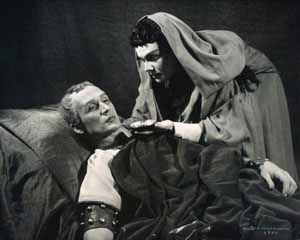
- click for larger image -From Act V
JULIAN.
My throat is parched. Can you not give me something to drink?
MAKRINA.
A drink of water, sir? (She holds a cup to his lips.)
ORIBASES. (whispering to her)
His wound bleeds inwardly. JULIAN.
Weep not. No Greek ought to weep for me; I go to the stars -
Transl. by Catherine Ray. |
|
During Roman
times, around 350, there is both a struggle for the throne and a decisive religious war in
the old world. Young Julian is the half brother of Gallos, heir to the throne, and they
are persecuted by Emperor Konstanzios who has killed off the rest of their family. Julian
feels he is made for greatness, he is a seeker and waivers between the new Christianity
and the old heathen beliefs. After the death of Gallos, Julian becomes the heir and gets
the Emperor’s sister Helena for his wife. After some impressive victories over the
barbarians, Emperor Konstanzios wants to put a stop to this much too successful youngster,
and attempts to have him murdered. Instead it is Helena who dies, and in her last breath
she confesses to Julian that he is not the father of the child she is carrying. This leads
Julian to break with Christianity and declare his allegiance to the old gods. When he has
lead his army to Rome, the old emperor is dead, and Julian, now Emperor, declares freedom
of religion in spite of his own apostasy. Now it is the Christians who go on a bloody
campaign against him, and he is murdered in the desert by an old friend who is a
Christian. He has fallen victim to his own idealism. |
